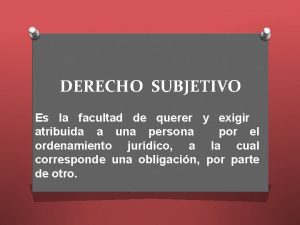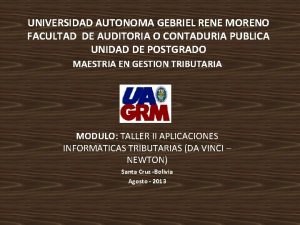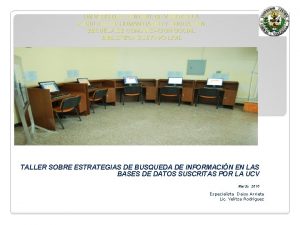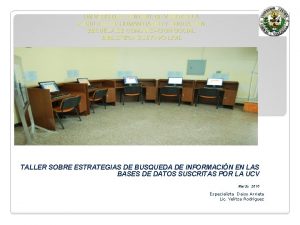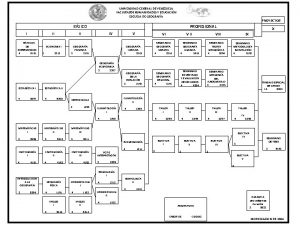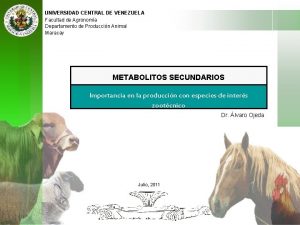UNIVERSIDAD CENTRAL DE VENEZUELA FACULTAD DE HUMANIDADES Y




















































































- Slides: 84

UNIVERSIDAD CENTRAL DE VENEZUELA FACULTAD DE HUMANIDADES Y EDUCACIÓN Comisión de Estudios de Postgrado Área de Lingüística Maestría en Inglés, mención Inglés como Lengua Extranjera Mood and Modality Student: Salazar, Mariángeles

Systems within the interpersonal component Linguistic phenomena are social in the sense that whenever people speak/listen or write, they do so in ways that are determined socially and have social effects. (Fairclough 1989)

The interpersonal function is concerned with the establishment of the individual in all kinds of personal interaction. From this perspective two models will stand for the fulfillment of the interpersonal function: Mood and Modality.

Mood It has the value of showing the types of roles that speakers and hearers take in linguistic exchange. (Simpson, 1993)

Modality It refers broadly to a speaker's attitude towards, and opinion about, the truth of a proposition expressed by a sentence. (Simpson, 1993)

Mood It is an option available within the interpersonal component of language. The mood systems are choices between different roles that a speaker can select for himself and for his hearer. Mood is the form of the verb that shows the mode or manner in which a thought is expressed.

Roles of Addressers and Audience Geoff Thompson (1996) Purpose of communicative exchange: to order, apologize, confirm, invite, reject, evaluate, describe. The most fundamental purposes in any exchange are GIVING (and taking) or DEMANDING (and being given) a commodity of some kind.

Halliday has often argued forcefully against looking at language in terms of ‘constituents’ – that is, breaking clauses into groups and then groups into words, and assigning each ‘bit’ an identifiable meaning. As a rule, interpersonal meanings are not inherently tied to specific constituents but spread over the whole clause; and they may well be cumulative, reinforced by being expressed at several points in the

Roles of Addressers and Audience From the point of view of a speaker in a verbal exchange, the commodity that the speaker may be giving or demanding is INFORMATION. This is carried out only through language. The speaker makes a statement to give information, or asks a question to demand it. The exchange is successful if the

Roles of Addressers and Audience that the speaker gives or provides the information demanded (answers the question). Sometimes the exchange will only be successful if a non-verbal action is carried out and if the listener obeys the command. When this happens a new commodity has to be included. Halliday (1994) calls this commodity

Roles of Addressers and Audience There are four basic SPEECH ROLES: Giving information Demanding information Giving goods-&-services Demanding goods-&-services The usual labels for these functions are: Statements Questions Offers Commands

Roles of Addressers and Audience Basic Speech Roles Role in exchange Commodity exchanged (a) good -&- services (b) Information (i) giving (ii) demanding Offer Statement I’ll show you the way. We’re nearly there. Command Question Give me your hand. Is this the place?

Roles of Addressers and Audience Three of these basic functions are closely associated with particular grammatical structure: expressed by Statements declarative clauses Questions interrogative clauses Commands imperative clauses

Mood The mood system in English is divided into four subcategories. FUENTE

Indicative Mood The indicative mood 'indicates‘ something. It conveys to the listener/reader that the speaker/writer is making a statement, referring to the real world in an honest, direct, relevant way. The majority of our expressions are indicative in mood.

Indicative Mood Speakers signal the indicative mood by using word order. When the auxiliaries = Finite take their "usual" position following the 'subject, ' we interpret the clause as being in the indicative mood. (Declarative) a. - Little Rock is the capital of Arkansas. b. - Ostriches cannot fly.

MOOD The clauses 1. - Small boys are naturally dirty. 2. - Has John closed the door? have both chosen INDICATIVE. However, the syntactic pattern in each one of them is different. INDICATIVE makes a further choice

Indicative Mood • Declarative Mood INDICATIVE • Interrogative Clause one (1) Small boys are naturally dirty. has chosen indicative declarative. Clause two (2) Has John closed the door? has chosen indicative interrogative.

MOOD Indicative interrogative clauses make a further choice • Declarative • Closed INDICATIVE • Interrogative Mood • Open

Interrogative Mood The interrogative mood signals the speakers' desire for information, that they are asking a question, that they are 'interrogating' the listeners. The interrogative is marked by starting a clause with an auxiliary = Finite verb or an interrogative pronoun.

MOOD Declarative • Closed INDICATIVE Interrogative • Open • Yes/ No Questions • Alternative Questions • Tag Questions • Wh - Questions

Interrogative Mood Examples A. - Closed Interrogative Clauses Don’t you like it? Y/N Question Tea or coffee? Alternative Question This is easy, isn’t it? Tag Question Are you Leaving? Y/N Question Did the doctor give you the medicine? Question Blue or yellow? Y/N

Interrogative Mood B. - Open Interrogative Clauses Information questions What’s your favorite place? When have you decided to come? How do you prefer your coffee?

Imperative Mood The imperative mood expresses the speakers' sense of a command, request, exhortation, or advice. Speakers signal the imperative mood by using a base form of the verb in clause-initial position. Don’t smoke in this building. Be careful! Don’t drown that puppy!

Imperative Mood It influences other people’s behavior. The speaker of a clause that has chosen imperative has selected himself the role of CONTROLLER and for his hearer the role of CONTROLLED. The clauses Clean the room Let us clean the room represent imperative mood.

Imperative Mood However the syntactic patterns are different, their meanings are different, too. The speaker of a clause that has chosen IMPERATIVE mood makes a further choice: Exclusive Imperative Inclusive

Imperative Mood Consider the following clauses a. - Wash your hands. b. - Let us consider the matter. Clause (a) the speaker excludes him/herself from the performers Imperative Exclusive Clause (b) the speaker includes him/herself among the performers Imperative Inclusive Clause

Subjunctive Mood The subjunctive mood expresses the speakers' sense of the unlikely, a wish, a prayer, a hope. The subjunctive describes the state of affairs as speakers wish or hope them to be. It describes hypothetical situations, "some other world, " the unreal.

Subjunctive Mood Speakers signal the subjunctive by beginning subordinate clauses with an auxiliary = Finite or by using subordinators that overtly mark hypothetical conditions. Examples Had I known you were coming, I would have baked a cake. If I were a millionaire, I would endow an award in your honor.

Subjunctive Mood The subjunctive is also marked in the verb phrase by the use of subject-verb concord, where the singular subject I is matched with the plural verb were. Base forms of verbs can also signal the subjunctive. Examples: I suggest that Ms. Jones reconsider her decision. The administration insists that no one be exempted from the placement

The Mood System The mood system is an option available within the interpersonal function. It shows the roles that a speaker has selected for him/herself and for his/her hearer. • Indicative Declarative • Interrogative Mood • Close d • Open • Exclusiv • Imperative e • Inclusive • Subjunctive • Yes/No • Alternative • Tag Wh-

Modality It refers broadly to a speaker's attitude towards, and opinion about, the truth of a proposition expressed by a sentence. (Simpson, 1993)

THE MODAL VERBS Their morphology and syntax being so limited, the English modals had to develop a high semantic potential that is extremely context sensitive; for that reason, mistaking one modal for another could bring about the changes in meaning that would direct the message and communication the wrong way.

THE MODAL VERBS Compare: You must go home now: You might go home now. 2) How come that you can say: You should see a doctor and You ought to see a doctor? Or You may go now and You can go now. I will receive him tomorrow and I shall receive him tomorrow.

THE MODAL VERBS Some modals overlap in meaning, though they are not 100% synonymous. That is a consequence of an ongoing process called the semantic change. That fact makes the modal verbs probably the most difficult part of the English grammar to explain as well as to master.

THE MODAL VERBS The English modal verbs can be classified into groups: central : MUST, CAN/COULD, SHALL/SHOULD, WILL/WOULD, MAY/MIGHT (9 forms) marginal : OUGHT TO, NEED, DARE, USED TO (4 forms)

Apart from these forms, there also the so-called semimodals and modal idioms. Semi-modals: BE ABLE TO, BE ABOUT TO, BE APT TO, BE BOUND TO, BE CERTAIN TO, BE DESTINED TO, BE DUE TO, BE GOING TO, BE LIKELY TO, BE MEANT TO, BE OBLIGED TO, BE SUPPOSED TO, BE SURE TO, BE WILLING TO, HAVE TO. Modal idioms: HAD BETTER, HAD RATHER, WOULD RATHER, WOULD SOONER, WOULD AS SOON, MAY/MIGHT AS WELL, HAD BEST, BE TO, HAVE GOT TO.

Certainty Modality Uncertainty Ex. I am quite sure. I know. I don’t know. I suppose.

Halliday (1975) proposed another system to represent degrees o obligation: MODULATION Ex. You must do this. They are supposed to do that. We are allowed to remain here. Modality Modulation represents the speaker’s judgment of probability expresses the speaker’s assessment of obligation

High value: certain Modality Median value: probable Low value: possible High value modality: I know you’re there. I’m quite sure she’s coming. It’s certain that John has forgotten. Median value modality: Maybe John has forgotten. I might be late. It is probable that she hasn’t studied. Low value modality: He seemed a kind man. There is a possibility that he won’t.

Halliday (1975) Modality elements are expressed by: Verbs Adverbs (modal Maybe, auxiliaries) possibly, may, might, perhaps, can, could, probably, will, would, presumable, etc. surely, obviously, certainly. Adjectives Nouns Possible, likely, obvious, sure, etc. Possibility, chance, likelihood, probability, etc.

High value: required Modulation Median value: supposed Low value: allowed High value modulation: You’re required to finish that report by 2. Essays were to be typed. You’re not allowed to enter that room. Median value modality: They’re supposed to bring their You mustn’t smoke in a hospital. books. You should go to the doctor. I’d like you to read aloud. Low value modality: You are not required to do so. They can’t stay at home. We’re allowed to go out.

Halliday (1975) Modality and modulation systems: ü Use common grammatical elements, ex. must, can, suppose, etc. ü Use of the terms high, median, low. They might be considered scales and not systems ü Do not include questions like expressions of desire which is a common element within the personal subcomponent of language. ü Adverbs like luckily, unfortunately, and regrettably were not considered.

Simpson (1993) proposes only one system which compiles both modality and modulation: Modality System Certainty: Attitudinal aspect of language (degree) I’m sure it will rain today. Perception: He seemed upset about it. Desire: I hope you enjoy the tip. Obligation: He should be arriving any minute now.

Epistemic Perception Modality Boulomaic Deontic Epistemic certainty I know it’s going to be hard. It must be raining there. I suppose he will consider this matter. perception We think it might be enough for them. It seems to be the best solution. It would appear that they were normal.

Boulomaic desire expressions of I wish you were here. If only I were rich. Hopefully, he will quit soon. Unfortunately, I couldn’t be there on time. We regret that so many young people leave. the university without qualifications. Deontic obligation expressions of Such things ought not to be allowed. You are required to start work at seven. He demanded that he be told everything. There’s no need for you to go yet.

Modality Thompson (1996) Types of Modality Commodity Information Probability (how likely it is to be true): possible/probable/certain Usuality (how frequently it is true): sometimes/often/always Commodity Good&Services Obligation (on the other person to carry out a command): permissible/advisable/obligatory Willingness (inclination of the speaker to fulfill the offer): ability/willingness/determination

Thompson (1996) Types of Modality probability: The child might be her modalisation (information) usuality: She often went there. Type of modality modulation (good&services) obligation: You should go now. inclination: I’ll give you a hand.

Modal Commitment Modalisation Modulation HIGH I shall never be happy again. You must ask someone. MEDIAN They should be back by now. You ought to invite her. LOW I may be quite wrong. You can help yourself to a drink. Speaker’s commitment: the degree to which the speaker commits himself or herself to the validity of what s/he is saying.

Modal Responsibility It can be graded according to how far the speaker overtly accepts responsibility for the attitude being expressed. Modalisation Modulation Explicit subjectivity I’m sure we should sell I don’t advise you to drink it. this place. Implicit subjectivity She might have written I mustn't go there anymore. to me. Implicit objective We probably won’t A cathedral is supposed to be old. repay it. Explicit objective It’s likely that they’ve It’s essential that you leave at once. heard by now.

Modality may be defined as the way in which the meaning of a proposition is modified as to reflect the speaker's/ subject’s attitude towards the likelihood of the proposition content being or becoming true.

Yes No Cigarettes are bad for you. Cigarettes must be bad for you. Cigarettes can be bad for you. Cigarettes could be bad for you. Cigarettes may be bad for you. Cigarettes might not be bad for you. Cigarettes may not be bad for you. Cigarettes could not be bad for you. Cigarettes cannot be bad for you. Cigarettes should not be bad for you. Cigarettes are not bad for you.

High Cigarettes are bad for you Cigarettes must be bad for you. Cigarettes can be bad for you. Cigarettes could be bad for you. Cigarettes may be bad for you. Cigarettes might not be bad for you. Cigarettes may not be bad for you. Cigarettes could not be bad for you. Cigarettes cannot be bad for you. Cigarettes should not be bad for you. Cigarettes are not bad for you. (positive) Low (negative) High (negative)

Mood Analysis Extract from the movie “Little Miss Sunshine”

Review of the comedy movie: “Little Miss Sunshine” Frank Grandpa Dwayne Sheryl Olive Richard

Context. The Family is having dinner after Sheryl arrives with his suicidal brother Frank, making Richard uncomfortable with his presence. Meanwhile, unpleasant conversations were in progress, Richard told Olive about a message on the telephone machine. The Dialogue begins with this message.

Analysis applying Mood System Answering Machine (Cindy’s message): – Sheryl, it´s Cindy. (Indicative Declarative). – Remember when Olive was here last month? (Interrogative Closed). – She was runner up in the Regional Little Miss Sunshine? (Interrogative Closed).

◦ They just called right now and said that the girl who won had to forfeit her crown. (Indicative Declarative). ◦ I don´t know why something about diet pills. (Indicative Declarative). ◦ Now she has a place in the State Contest in Redondo Beach! (Indicative Declarative).

Dialogue Richard: What happened? (Interrogative Opened). Sheryl: I´m just calling to – Cindy! (Indicative Declarative). Yeah we just got it. (Indicative Declarative). Yeah, she basically went crazy. (Indicative Declarative). No, I didn´t get that. (Indicative Declarative). The machine cut you off, Okay. (Indicative Declarative). Redondo Beach. This Sunday ? (Interrogative Closed). WH – are you guys going? (Interrogative Closed)

Sheryl: They have some equestrian thing in Santa Barbara. (Indicative Declarative). Richard: You know, they do that horse shit every single weekend. (Indicative Declarative). Sheryl: Well, it´s the Nationals. (Indicative Declarative). They’re taking both horses, so apparently it´s a big deal. (Indicative Declarative).

BLAH!

Richard: What about Olive? (Interrogative Opened). You promised! (Indicative Declarative). Sheryl: We’ll fly out and come back Monday. (Indicative Declarative). Richard: How are you gonna get around out there? (Interrogative Opened). Sheryl: We’ll rent a car. (Indicative Declarative).

Richard: We can’t afford it. (Indicative Declarative). Sheryl: Well, that’s what we’re gonna do unless you have a better idea. (Indicative Declarative). Richard: All right. I’ll drive the bus. (Indicative Declarative).

Mood Chart: “Little Miss Sunshine Conversation extract” Mood Richard Sheryl Grandpa 1. Indicative Declarative. 11 23 04 Cindy’s message 04 2. Indicative Interrogative Opened. 06 01 01 00 3. Indicative Interrogative Closed. 02 03 00 02 4. Imperative Exclusive. 01 00 00 00 5. Imperative Inclusive. 00 00

This is it for Mood analysis!

Modality Analysis Extract from the short story “Charles” by Shirley Jackson.

Review of the short story: “Charles” Charles

Background The Modality System is going to be applied on Shirley Jackson’s “Charles” short story, written in 1948, in which according to Jackson (1950) the action of the story covers a time span of a little more than four weeks. The story is told by the mother, as first-person narrator, where she is both, observer of the action and is involved in it.

Context Jackson (1948) short story “Charles” concerned about a little boy called Laurie who has started the kindergarten, and keeps his parents in suspense with stories about Laurie’s partner called Charles and his notorious behaviors.

Analysis applying Modality System Modality Speaker Sentence Epistemic 1. “Thursday Charles had to stand in a corner duringstory-time because he kept pounding his feet on the floor. ” Deontic Modulation High 1. Laurie Boulomaic low High low

Modality Speaker Sentence Epistemic Boulomaic Deontic Modulation High 2. “The teacher had to make Charles keep quiet” 3. Throw him out of school, I guess. low High low

Modality Speaker Sentence Epistemic Boulomaic Deontic Modulation High 2. The Mother: (Narrator) 1. “ I wanted passionately to meet Charles’s mother” 2. “Well, he certainly likes kindergarten’ low High low

Modality Speaker Sentence Epistemic Boulomaic Deontic Modulation High 3. The Father 1. “This may mean he’s only plotting” 2. “Might as well meet them as later” low High low

ANALISIS OF THE CHART WITH A GRAPHIC REPRESENTATION OF THE CHARACTERS Laurie

It is observed that “Laurie”, one of the characters, produced more deontic utterances in reference to actions performed by someone else, in this case his notorious behavior known as “Charles”. Moreover, according to Simpson (1993), the deontic modality refers to expressions of obligations and permission, and in this case, “Laurie’s expressions submit to obligation that should have been performed by “himself” (Charles).

The epistemic modality reflected on Laurie’s graphic refers to the consciousness of his actions as Charles, and the possible consequences that he should be facing due to his behavior. Therefore, it is also possible, that Laurie’s manners lead him to be expelled out of the kindergarten, which would have been Charles’ objective.

The mother

The “the mother” which is also the narrator, produced a small percentage of the deontic modality, in terms of obligation, regarding the teacher’s work in the kindergarten, owing to Charles inappropriate conduct. Additionally, the epistemic utterance produced in the text are concerned in relation to her perceptions and suppose certainty about her son’s attitude toward his behavior at school (This seemed to be wrong until she finds out at the end).

Furthermore, the boulomaic utterances, which according to León (2004) are concerned about expressions of desire; reflect Laurie’s mother wishes about the actions that should be taken into account regarding Charles’s behavior at school and also reflects her desire of meeting Charles’ mothers, in order to understand his comportment.

The Father

“The father”, another character of the story, produced a great percentage of epistemic modality, due to different causes, for instance, he presented his perception towards Laurie’s partner’s notorious behavior and, as well, he shows he’s life experience through his utterances.

The boulomaic modality utterance presents his desires of understanding the familiar background in which Charles is growing up and that lead him to act the way he does. Therefore, this might suggest that the father states his opinions with reference to the child’s behavior.

Charles said: ‘This is it!’

Thank you!
 Austral universidad medicina
Austral universidad medicina Universidad de el salvador facultad de ciencias economicas
Universidad de el salvador facultad de ciencias economicas Universidad de los andes facultad de ciencias
Universidad de los andes facultad de ciencias Uptodate unisabana
Uptodate unisabana Hipertrofia pilorica
Hipertrofia pilorica Universidad de el salvador facultad de ciencias economicas
Universidad de el salvador facultad de ciencias economicas Universidad de carabobo facultad de odontologia
Universidad de carabobo facultad de odontologia Facultad de arquitectura universidad de panama
Facultad de arquitectura universidad de panama Universidad san martin de porres facultad de derecho
Universidad san martin de porres facultad de derecho Femenine
Femenine Universidad de carabobo facultad de derecho
Universidad de carabobo facultad de derecho Universidad de el salvador facultad de ciencias economicas
Universidad de el salvador facultad de ciencias economicas Facultad de informatica universidad de panama
Facultad de informatica universidad de panama Facultad de ciencias universidad mayor
Facultad de ciencias universidad mayor Universidad javeriana - facultad de medicina
Universidad javeriana - facultad de medicina Universidad bolivariana de venezuela ciudad bolivar
Universidad bolivariana de venezuela ciudad bolivar Universidad bolivariana de venezuela
Universidad bolivariana de venezuela Colegio academia de humanidades
Colegio academia de humanidades Bahaging pinaka-katawan ng sulatin.
Bahaging pinaka-katawan ng sulatin. Colegio de ciencias y humanidades plantel sur clave
Colegio de ciencias y humanidades plantel sur clave Bacharelado em humanidades
Bacharelado em humanidades Humanidades 1 colegio de bachilleres
Humanidades 1 colegio de bachilleres Experimento de kohler
Experimento de kohler Unne humanidades
Unne humanidades Principales hidroelectricas de venezuela
Principales hidroelectricas de venezuela Universidad central del ecuador
Universidad central del ecuador Universidad central de bayamon direccion
Universidad central de bayamon direccion Agroecological practices
Agroecological practices Uclv cuba
Uclv cuba Facultad de ciencias físicas ucm
Facultad de ciencias físicas ucm Portada facultad de derecho
Portada facultad de derecho Organigrama de la facultad de ingeniería.
Organigrama de la facultad de ingeniería. Facultad de bioanalisis
Facultad de bioanalisis Facultad de ciencias agricolas uce
Facultad de ciencias agricolas uce Facultad derecho ugr
Facultad derecho ugr Facultad de economia oruro
Facultad de economia oruro Facultad de derecho ufm
Facultad de derecho ufm Ecologia marina carrera
Ecologia marina carrera Facultad de ciencias administrativas unmsm
Facultad de ciencias administrativas unmsm Facultad de arquitectura escolares
Facultad de arquitectura escolares Facultad miguel enriquez
Facultad miguel enriquez Derecho subjetivo significado
Derecho subjetivo significado Facultad de bioanalisis xalapa
Facultad de bioanalisis xalapa Facultad de auditoria
Facultad de auditoria Horaris logopedia uab
Horaris logopedia uab Reglamento de admision docente uto
Reglamento de admision docente uto Facultad de voluntad
Facultad de voluntad Facultad de ciencias de la salud uma
Facultad de ciencias de la salud uma Facultad natural
Facultad natural Facultad de turismo en san marcos
Facultad de turismo en san marcos Facultad de psicologia
Facultad de psicologia Uv campus minatitlan
Uv campus minatitlan Facultad de ciencias quimicas unach
Facultad de ciencias quimicas unach Facultad de ciencias economicas tucuman
Facultad de ciencias economicas tucuman Facultad de medicina campeche
Facultad de medicina campeche Tusogen
Tusogen Facultad de ciencias medicas y biologicas dr ignacio chavez
Facultad de ciencias medicas y biologicas dr ignacio chavez Uedic
Uedic Facultad de ciencias economicas tucuman
Facultad de ciencias economicas tucuman Www.facultaddelenguas/ccia-registro
Www.facultaddelenguas/ccia-registro Logo facultad de odontologia usac
Logo facultad de odontologia usac Facultad de pedagogia xalapa
Facultad de pedagogia xalapa Facultad de arquitectura servicio social
Facultad de arquitectura servicio social Aulica don bosco san luis
Aulica don bosco san luis Recursos pesqueros y acuicolas de venezuela
Recursos pesqueros y acuicolas de venezuela Conclusión de la seguridad social en venezuela
Conclusión de la seguridad social en venezuela Latitud y longitud de venezuela
Latitud y longitud de venezuela Uniforme scout venezuela
Uniforme scout venezuela Colombia venezuela ecuador
Colombia venezuela ecuador Climate of venezuela
Climate of venezuela Piramide de kelsen venezuela
Piramide de kelsen venezuela Cual es el origen del castellano
Cual es el origen del castellano Arroz con leche se quiere casar cuban
Arroz con leche se quiere casar cuban Deeanna welling
Deeanna welling Organigrama del cne venezuela
Organigrama del cne venezuela Causas de la caida de la segunda republica
Causas de la caida de la segunda republica Venezuela physical geography
Venezuela physical geography Centrales hidroeléctricas de venezuela
Centrales hidroeléctricas de venezuela Programas de salud en venezuela
Programas de salud en venezuela Venezuela capital
Venezuela capital What is it
What is it Indicadores sociales en venezuela
Indicadores sociales en venezuela Mapa de venezuela agricultura
Mapa de venezuela agricultura Chalet felipe gonzalez tanger
Chalet felipe gonzalez tanger Mapa de los frentes geopoliticos venezolanos
Mapa de los frentes geopoliticos venezolanos









































